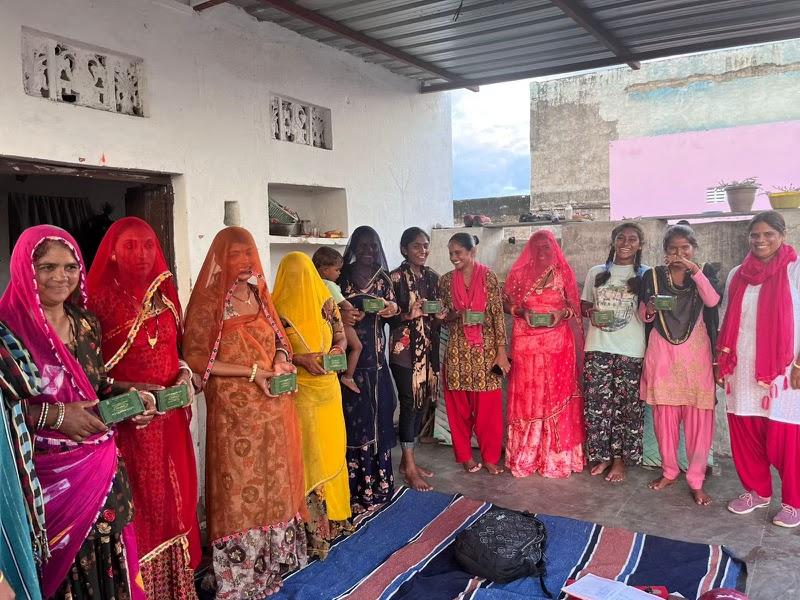Project RISHI (Rural India Social and Health Improvement) is a nonprofit organization working to promote sustainable development in rural India. Georgetown’s chapter, which was established in Fall 2020, aims to address the health of people in rural India after COVID-19 revealed the fragility of public health.
Georgetown’s Project RISHI chapter is currently partnered with the migrant female population in the district of Beawar in Ajmer, a city in Rajasthan, a state in northern India. Project RISHI has collaborated over the past year with Lucky Iron Fish, a Canadian social enterprise that manufactures tools that help fight iron deficiency, to increase iron levels in this population.

One major condition women in India face is iron deficiency anemia, which is caused by a lack of healthy red blood cells. Healthy red blood cells need to carry hemoglobin, a protein within red blood cells that carries oxygen, in order to get oxygen to the body’s tissue.
The university’s Project RISHI partnered with Gramin Avam Samajik Vikas Sanstha (GSVS), an NGO registered in Rajasthan. In their initial pilot study, GSVS tested the hemoglobin levels of 83 women and selected 30 anemic women to join the program. These women were then given the Lucky Shakti Leaf, a cooking tool produced by Lucky Iron Fish, that can be added to any acidified boiling liquid to infuse a meal with iron. On-site volunteers hosted workshops to teach the women how to incorporate the tool into their routine.
Vegetarian diets are a large part of Rajasthani culture because of the prevalence of Dharmic religions, and are a partial cause of the high rates of anemia in India. Iron sourced from a plant-based diet has a lower absorption rate than iron sourced from meat products; because of this, 52.7% of women aged 15 to 49 in Rajasthan are anemic.
“After researching and creating a desk review, we concluded that most women suffered from anemia in the region, and that it became a hindrance in their everyday activities,” Sanchi Gupta (CAS ’24), the club’s vice president of initiatives told The Hoya.
Project RISHI chose to use the Lucky Shakti Leaf to aid anemia after extensive research into other methods of iron intake, like pills.
Most of the women in the study used the leaf every day or a few times a week, according to Nicole Vernot-Jonas (SOH ’24), director of PR and marketing.
Project RISHI has seen promising results from their pilot project as of spring 2023, and they will be scaling up their project this year to reach more women in Rajasthan. In the pilot program brief, President Shreya Arora (SOH ’24), said most of the women had quantitative and qualitative evidence of improvement in iron intake.
“Twenty-three women saw their hemoglobin levels increase after 3 months. Women who were highly iron-deficient at the beginning of the pilot program (HB levels of 7 or 8) had a greater HB level increase than those who started the pilot program with higher hemoglobin levels (13 or 14),” Arora said.
“We researched on what programs have previously been working on iron deficiency alleviation, and found that most projects, including government projects, relied on iron pills, which many women aren’t fond of,” Gupta wrote to The Hoya. “We quickly realized that in order to get tangible results from our project, we need a product that does the job but is not a pill.”
Arora said participants in the pilot program preferred the leaf to other choices because of its ease of use, and the fact that it does not change the taste of the food. Participants also stated that they noticed the leaf lowering anemia symptoms like fatigue and headaches.
Project RISHI’s Lucky Iron Fish Project was inspired by a previous project with EcoFemme, a women-led social enterprise based in Tamil Nadu, India, that sells washable, reusable cloth pads and provides menstrual health education, according to Arora.
Georgetown’s Project RISHI chapter will send members to Rajasthan this summer to speak with the participants with the help of a Social Innovation and Public Service grant, according to Vernot-Jonas.
Arora said the results of Project RISHI’s projects thus far have supported the club’s overall goal of sustainable development in rural India.
“Georgetown Project RISHI’s mission and work is so important because we are committed to working in solidarity and close partnership with members of our partner communities to enact positive, sustainable social change in rural India,” Arora told The Hoya.
“Sustainability is at the core of all of our initiatives, and we hope that each RISHI project will eventually become self-sufficient without direct involvement from Project RISHI.”
Correction: This article was updated on 3/23/23 changing “Project Rishi” to “GSVS” to clarify the role of RISHI’s partner NGO in the pilot study.








